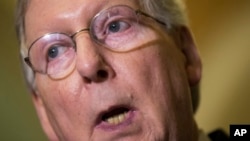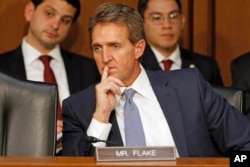Republicans in the U.S. Senate appear to be coming to grips with a reality many once thought unimaginable: that bombastic New York businessman Donald Trump is their party’s presumptive presidential nominee.
“He [Trump] won the nomination the old-fashioned way — he got more votes than anybody else,” Senate Majority Leader Mitch McConnell of Kentucky said Tuesday, after months of refusing to comment on the presidential contest. “We respect the voices of the Republican primary voters across the country.”
Trump is expected to meet with Republican lawmakers of both chambers Thursday, coming face to face with some who have expressed grave misgivings or outright opposition to his candidacy. That will include House Speaker Paul Ryan, who has refrained from endorsing Trump.
“It’s been one week since the primary effectively ended. It was a very, very bitter, divisive primary. It’s going to take more than a week just to repair and unify this party,” said Ryan in a Facebook Live interview with The Wall Street Journal on Tuesday.
Many House Republicans on their way to a floor vote Tuesday avoided answering questions about Trump, or offered tepid endorsements saying they would "support the party."
"By winning the primary, he's earned the right to be the nominee," said Representative John Shimkus, a Republican from Illinois.
But party leaders were emphasizing that reconciliation would come.
“We’re looking forward to having a cordial meeting to discuss the way forward. We know the alternative is four more years like the last eight. … We want to win the White House,” McConnell said.
“We’re going to engage with him [Trump],” said Senator John Cornyn of Texas. “There may well be, and sounds like will be, some areas of difference, and that’s fine.”
At the start of the primary season, Senator Jeff Flake openly rooted against Trump and expressed jubilation when the businessman failed to win the first contest, Iowa. On Tuesday, asked whether Trump now needed to heal wounds with lawmakers, the Arizona Republican shrugged.
“I don’t think fences need mending,” he said.
'Scary' notion
Even so, Flake criticized Trump’s recent assertion that the United States can simply print money to avoid a debt default.
“That’s scary, frankly. The notion that we could play with the markets that way when we’re the world’s reserve currency — that doesn’t sit well,” the senator said.
Democrats, meanwhile, are reveling in their Republican colleagues’ discomfort.
“The party of Abraham Lincoln, Theodore Roosevelt, Ronald Reagan, [Dwight] Eisenhower — the party of these great men nominated a misogynistic, anti-Latino, anti-Muslim, anti-immigrant xenophobe,” said Senate Minority Leader Harry Reid of Nevada. “Republicans … are scrambling to get behind this hate-sowing nominee.”
Trump's campaign pledges — including building a wall on the Mexican border to battle illegal immigration, or radically raising tariffs on Chinese products to address trade problems — break in significant ways from the Republican platform. Those policy differences are a key reason why Ryan has declined to endorse Trump.
But Ryan is making a mistake, according to Trump’s first Senate backer, Republican Jeff Sessions of Alabama.
“Trump does want to meet with him [Ryan] and I am hopeful that they will meet [Thursday],” Sessions said. “He [Trump] went out and won the support of millions of Republicans, and many of his [primary] opponents were advocating positions totally in sync with Speaker Ryan’s positions.”
“But Trump won,” Sessions added.






